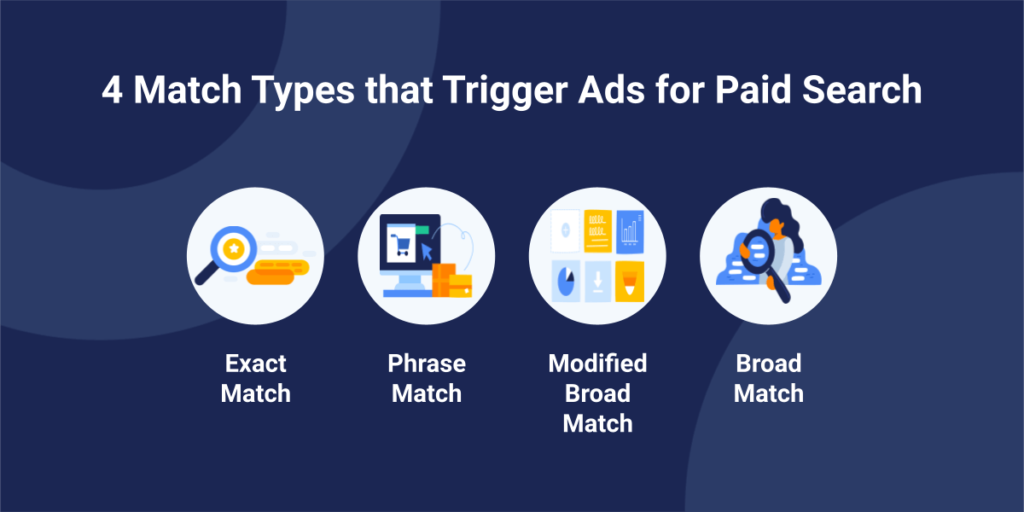Are you tired of seeing unsatisfactory results from your keyword strategies? Are you confused about whether to use exact match or broad match keywords? Don’t worry; you’re not alone. The world of search engine optimization (SEO) has too many technical things and complex algorithms, but understanding the basics of keyword matching is crucial to your success.
In this blog, we’ll cover the differences between exact match vs broad match keywords and help you decide which strategy is right for your business. This guide will give you the understanding to optimize your keyword strategy and take your online presence to the next level. So, let’s jump in and explore the world of keyword matching.
What Are Exact Match Keywords?

Exact match keywords refer to specific search terms a user enters into a search engine. When a website’s content contains exact match keywords that match the user’s search query, it has a higher chance of appearing at the top of the search results. This is because search engines like Google use algorithms to analyze the relevance of a website’s content to a user intent query. Exact match keywords can optimize a website’s content for search engines and increase its visibility to potential customers. However, it’s essential to use exact-match keywords strategically and not overuse them, as this can lead to penalties from search engines for keyword stuffing.
What Are Broad Match Keywords?
Broad match keywords are a type of keyword match type used in digital marketing and search engine optimization (SEO). Broad match keywords allow advertisers to target a wider audience by showing their ads to users who search for variations of their target keyword. For example, if an advertiser targets the broad match keyword “running shoes,” their ad may also be shown to users searching for “best running shoes,” “cheap running shoes,” or “running sneakers.” While this can increase the reach of an ad campaign, it can also result in lower relevance and a higher cost per click. It’s crucial for advertisers to carefully monitor and adjust their broad match keywords to ensure they are reaching their desired audience while still maximizing their return on investment.
When to Use Exact Match Vs Broad Match

Certain factors need to be considered for keyword targeting in search engine marketing for exact match and broad match keywords. Here are some factors to consider when choosing between the two:
- Keyword Specificity: Exact match keywords are particular and target only those search queries that exactly match the keyword, while broad match keywords are more general and can target a wide range of related search queries. If you have precise keywords that you want to target, then an exact match would be more appropriate. On the other hand, if you have more general keywords that can have multiple interpretations, then a broad match may be a better option.
- Campaign Goals: The goals of your advertising campaign can also help determine which keyword-matching option to choose. If your goal is to drive more traffic to your website, then a broad match may be more effective. However, an exact match would be better if you are looking for highly targeted traffic that is more likely to convert.
- Budget Friendly: Your advertising budget can also play a role in determining which keyword-matching option to use. Broad-match keywords tend to have a higher search volume and are more expensive. If you have a limited budget, you should focus on more specific exact-match keywords to drive targeted traffic while keeping costs down.
Tips for Determining Which Keyword Strategy Is Best for Your Business:

- Do keyword research to understand the search terms that your target audience is using.
- Analyze your competition and identify the keywords they are targeting.
- Test different keyword-matching options to see which drives more traffic and conversions.
- Consider the stage of the buyer’s journey that your target audience is in, as this can impact the specificity of the keywords you target.
In search engine advertising, exact match triggers ads only by the precise search term or phrase you specified. In comparison, the broad match will enable ads to be triggered by any relevant search term or phrase, including variations and synonyms.
Best Practices for Using Exact Match Vs Broad Match
Here are some best practices for using exact match and broad match:
- Exact Match Keywords for High-Intent: The exact match is most effective for high-intent keywords, where the user searches for a specific product or service. These keywords are more likely to convert into sales, and using exact matches will help ensure that your ad is visible only to people actively searching for your product or service.
- Broad Match for Low-Intent Keywords: Broad match is best used for low-intent keywords, where the user may be researching a topic or looking for more general information. This keyword may not lead to immediate conversions but can help generate brand awareness or drive traffic to your website.
- Monitor and Refine Keyword Lists: Regularly monitor and refine keywords based on performance. Remove irrelevant keywords and add new ones relevant to your target audience.
- Use Negative Keywords: Use negative keywords to exclude your ads from appearing for irrelevant searches. For instance, if you sell only new products, you may want to use “used” as a negative keyword to avoid showing up for searches for used products. They can be added in Google Ads with ease.
- Adjust Bid Amounts: Adjust your bid amounts based on performance. If a keyword generates a high return on investment, consider increasing the bid to ensure your ad will work more frequently. If a keyword generates low returns, consider lowering the bid or removing it altogether.
- Use Ad Groups: Use ad groups to organize your campaigns and target specific audiences. This will help you create more targeted ads and ensure your keywords are relevant to your target audience.
By following these best practices, you can optimize your use of exact match and broad match to achieve the best possible results from your search engine optimization and advertising campaigns.
Select the right keyword strategy for your business’s needs!

Choosing the right keyword strategy is crucial to any business’s digital marketing plan. By carefully selecting relevant keywords and optimizing content around them, companies can increase their visibility and attract more traffic to their website. However, it is essential to consider factors such as search volume, competition, and user intent to ensure that the selected keywords align with the business’s goals and target audience. With the right keyword strategist, businesses can establish a robust online presence and drive growth and success in today’s digital landscape.
Dallas SEO Pros have got you covered. Contact us today to take your SEO game to the next level.



